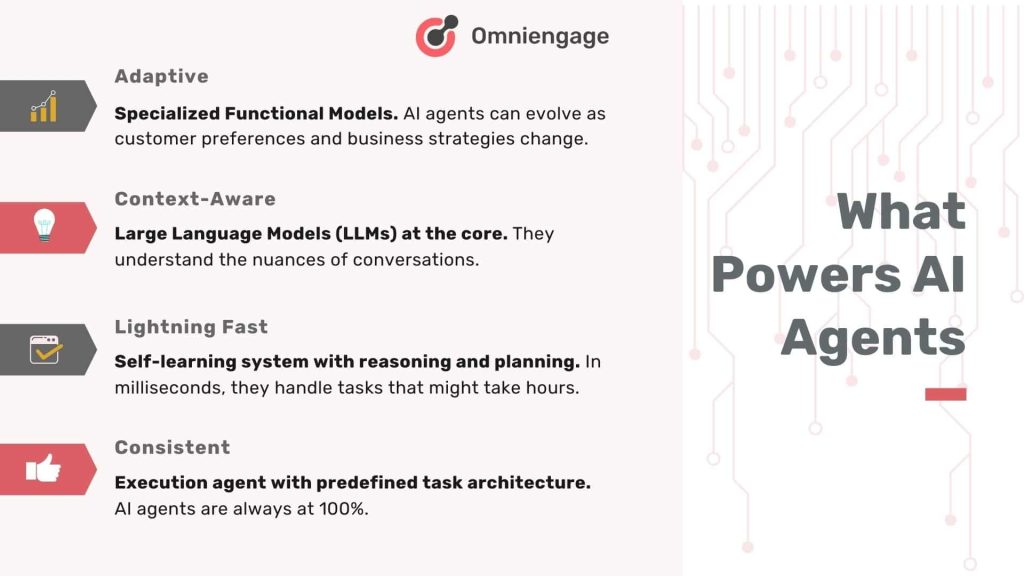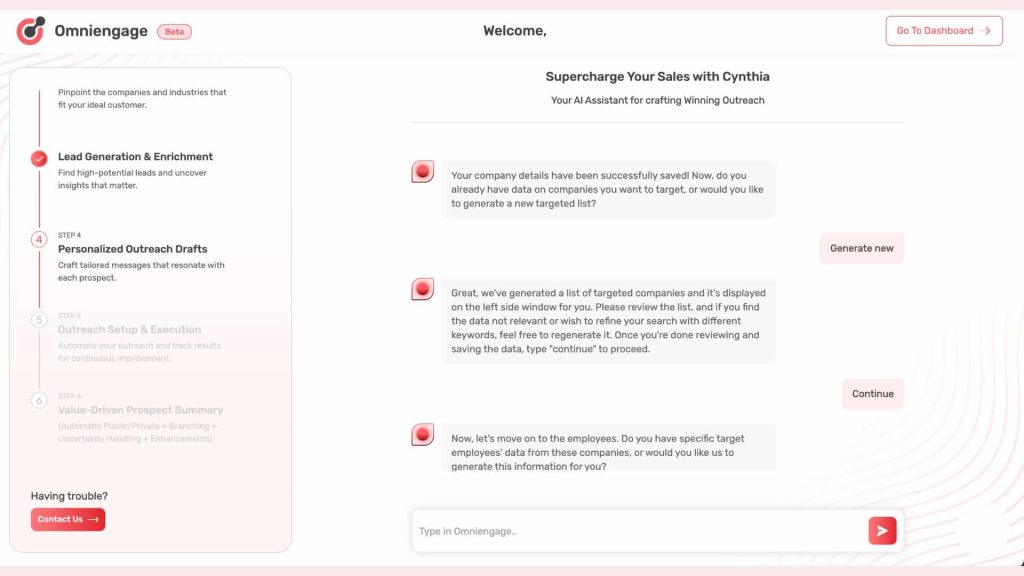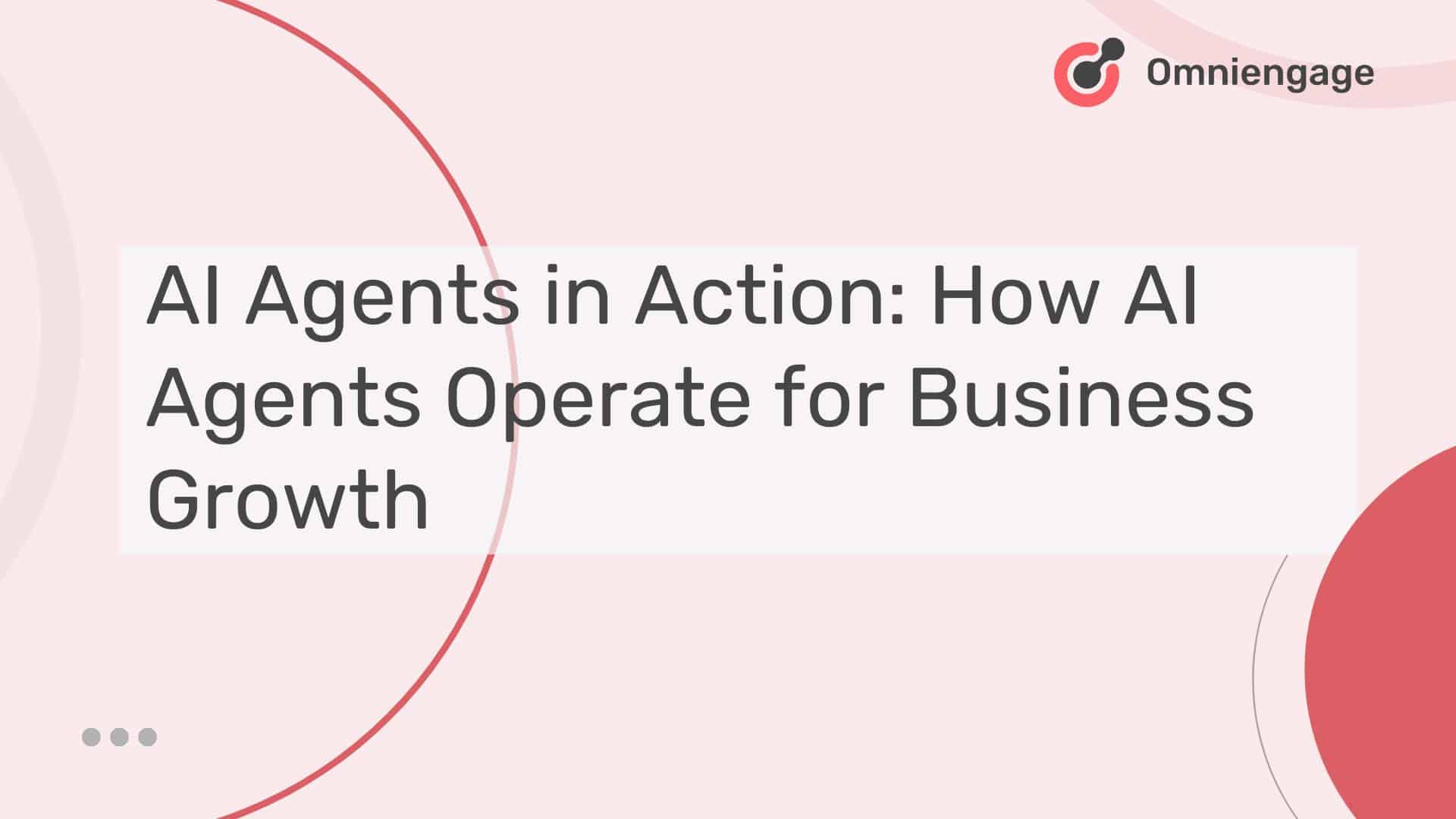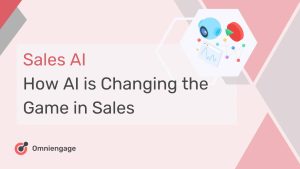How can you resolve even the most minor issues in your business, ensuring customer satisfaction? The solution isn’t a superhero from a movie but something more impressive – an AI agent. They work behind the scenes, ensuring your business runs smoothly with personalized intelligence and precision. They are the invisible force that coordinates your business operation for a perfect performance.
If you haven’t yet delved into the world of AI agents, consider this your invite. This post is your grand tour into a universe where AI assistants, chatbots, and algorithms don’t just answer questions. We’re talking about prediction, task execution, easing concerns, and creating very artistic brand experiences.
What are AI agents?
AI agents are intelligent software systems with virtual interfaces that combine various artificial intelligence technologies, such as natural language processing, machine learning, and knowledge representation. They are designed to understand and process information, reason, and perform tasks autonomously or with minimal human intervention.
If you’ve seen the movie “Her,” you’ve met Samantha – the invisible AI entity that became more than just an assistant to Joaquin Phoenix’s character. In reality, virtual assistants like Amazon’s Alexa or Apple’s Siri are already proving their mettle, handling queries, scheduling appointments, and delighting with their wide-eyed convenience.

How can AI agents assist with specific business tasks? AI agents are digital dynamos that can glide through your operations, seamlessly integrating with existing systems, databases, and third-party services. This enables them to automate processes, retrieve information, and perform actions across business functions.
For instance, in sales, AI agents can assist representatives by identifying and qualifying potential prospects based on specific criteria, automating lead generation and outreach efforts, and providing valuable insights and context about companies and decision-makers.
AI agents transform omnichannel communication strategies by enabling businesses to deliver personalized experiences across multiple touchpoints. AI agents can help with personalized content creation, campaign optimization, and customer segmentation in marketing. They can engage with customers on their preferred platforms by integrating multiple channels. Now, be it email, social media, or messaging apps, you can use AI agents flawlessly in omnichannel communications.
AI agents can analyze customer data from multiple sources, creating unified profiles and allowing consistent and custom communication across all channels. This omnichannel approach boosts your operations and helps you achieve outcomes faster by providing a more cohesive experience.
How does an AI agent work? Key characteristics:
In a nutshell AI agents have these characteristics:
- Adaptive: AI agents can evolve as customer preferences and business strategies change.
- Context-Aware: They understand the nuances of conversations and transactions.
- Lightning Fast: In milliseconds, they handle tasks that might take hours.
- Consistent: No bad hair days or Monday blues; AI agents are always at 100%.
But how do you ask? Do they have the capability to comprehend and engage with us naturally? Just like business comrades would, in ways that go far beyond automated emails? Let’s plug into the nuance.
Large Language Models (LLMs) at the core
Large language models (LLMs) are a key component that serves as the cognitive core of many modern AI agents. The training involves advanced machine learning techniques like transformer architectures (GPT and BERT). LLMs are useful for capturing and representing complex linguistic patterns and relationships.
While LLMs provide language understanding and generation capabilities, AI agents incorporate components to enhance their functionality and task execution for better workflow automation.
Execution agent with predefined task architecture
This component is an intermediary between the LLM and the actual task execution. It breaks down high-level instructions or requests from the user into a series of actionable steps or sub-tasks. The execution agent can then delegate these sub-tasks to appropriate tools, APIs, or other specialized components within the agent’s architecture.

AI agents powered by LLMs can understand and communicate naturally, but incorporating specialized components takes their capabilities even further. This allows businesses to automate processes more efficiently and deliver superior user experiences:
Specialized functional models that are adaptive
AI agents can automate complex jobs custom to a business need. This could include intelligent product tagging, voice interfaces for seamless customer service, or personalized content recommendations to boost engagement.
Self-learning system with reasoning and planning
With reasoning capabilities, agents can logically analyze data, plan sequences of actions, and make informed decisions. This smart automation optimizes operations like supply chain management. It also streamlines workflows by automating repetitive tasks and provides data-driven recommendations for strategic business decisions.
User-friendly interfaces
Natural interfaces like chatbots, virtual assistants, and voice make human-AI interactions intuitive. Customers can easily get 24/7 support, while employees benefit from intelligent knowledge assistants. Conversational interfaces also enable engaging commerce experiences.
Seamless integrations for optimal delivery
When agents connect to systems like CRMs, ERPs and third-party data sources through APIs, they can leverage unified data for contextual interactions. AI agents provide real-time process visibility and intelligent process automation across business functions.
Businesses gain a significant competitive edge by combining large language models with specialized AI components, user-friendly interfaces and connectedness. They can automate intelligently, deliver exceptional user experiences, make data-driven decisions and ultimately drive growth through operational excellence.
The combination of LLMs, specialized components, and external tools helps AI agents understand and execute a wide range of tasks. They can still maintain natural language interactions and contextual awareness.
Examples of AI agents in action
Have you identified emerging technologies that could give you a competitive advantage? Do you think that AI is a significant leap forward as the majority do? AI offers a huge competitive advantage in automating your workflows, which can help you stay ahead of the competition. However, the real game-changer lies in tapping into custom AI agents’ power to streamline these critical functions. Let’s explore how agents in AI are automating operations in sales, marketing, customer support, human resources and more.
Sales AI agents: Accelerating sales with AI automation
Custom AI agents can revolutionize sales processes by automating time-consuming tasks and providing data-driven insights. Imagine having an intelligent assistant that qualifies leads, schedules follow-ups, forecasts pipelines, and even nudges your team with the best actions. With AI handling the grunt work, your sales reps can focus on what they do best—building relationships and closing deals.
Marketing: Amplifying marketing efforts with AI
Custom AI opens up a world of possibilities for marketers for personalized, targeted campaigns. These agents can analyze customer data, segment audiences, and automate email nurture streams with custom content. AI can intelligently manage interactions, monitor trends, and optimize ad spending on social media. From lead scoring to content curation, AI-powered marketing automation means maximizing ROI while delivering exceptional customer experiences.
Customer Support: Elevating customer support with AI agents
In customer support, AI agents can be true game-changers. Imagine an AI-powered chatbot or virtual assistant that can handle routine queries, troubleshoot issues, and even resolve complaints with human-like interactions. As these agents continue learning from each customer conversation, they become better at providing fast, personalized support around the clock, reducing wait times and boosting satisfaction.
Human Resources: Simplifying team solutions
Agents in AI are bringing a revolution to the HR industry with their intelligent recruitment tools for candidate sourcing, resume screening, and conducting conversational interviews. They also simplify employee onboarding, payroll processing, and performance management. These agents automate repetitive tasks, freeing up HR teams to focus on strategic initiatives. As a result, HR departments can become more efficient, productive, and effective in their operations.
Supply Chain Management: Predictive demand management
Supply chains utilize AI agents for demand forecasting capabilities, which optimize inventory levels based on sales data and market trends. They help enhance logistics planning through intelligent route optimization and real-time tracking. AI-powered predictive maintenance significantly reduces equipment downtime. Additionally, automated procurement ensures cost-effective sourcing.
AI agents you can try right now
Ready to shake hands with an AI agent? Here are a few ‘Hello World’ icebreakers to get you started.
Sales and Marketing
OmniEngage
Gain an edge in sales and marketing with OmniEngage’s AI agent. This exceptional assistant can accelerate customer acquisition, retention, and revenue growth. You can create personalized, multi-channel campaigns that resonate with your customers.

Picture an assistant that identifies the most promising leads and crafts customized marketing journeys across email, social media, and text messaging. OmniEngage’s AI sales agent, Cynthia, generates compelling outreach sequences, complete with personalized messaging, taking the guesswork out of channel selection and timing to ensure your communications hit the mark.
Salesforce Einstein
Salesforce Einstein can help you automate your sales and marketing workflows, predict opportunities, and personalize customer journeys. With Einstein, you can leverage machine learning and predictive analytics to streamline workflows and improve productivity. Say goodbye to manual lead scoring and hello to more time to focus on growing your business.
Customer Service and Support
Dialogflow (Google)
It’s time to enhance your customer support experience with AI-powered chatbots. Dialogflow lets you build conversational interfaces that leverage natural language processing and machine learning. This means you can automate customer interactions across multiple channels, making it easier to handle customer requests.
Amazon Lex
Looking for a way to provide your customers with an exceptional experience? Amazon Lex is here to help. It enables you to create natural language interfaces for virtual assistants, making it easier for customers to get the support they need. With features like automatic speech recognition and NLP, you can provide conversational AI experiences that your customers will appreciate.
Bonus: The Chatbot Round-Up
- Drift: A conversational marketing platform that boasts AI-powered chat.
- ManyChat: For those who want to dip a toe into creating their ch atbot for Facebook.
- Zendesk Chat: Intuitive and proactive, allowing for personalized live chat with customers.
- Chatbot Builder: Affordable, drag-and-drop, AI chatbot builder with multi-device deployment.
Human Resources
IBM Watson Candidate Assistant
IBM Watson Candidate Assistant is the future of the hiring process. The AI agent can automate candidate screening, interview scheduling, and FAQs. Imagine having a personal assistant who can handle all the admin tasks and give you more time to focus on candidate engagement. Watson’s personalized candidate experiences improve hiring outcomes and create a positive candidate impression.
SAP Intelligent Robotic Process Automation
The AI agent is a game-changer for HR teams. By automating onboarding, payroll processing, and documentation workflows, HR teams can focus on strategic initiatives that drive organizational success. This tool saves time and boosts efficiency by combining AI and automation. Leverage the power of AI-powered tools like IBM Watson and SAP Intelligent RPA to improve your HR department’s productivity and deliver better outcomes.
Supply Chain and Logistics
Google Cloud Pipelines
The AI agent streamlines the supply chain and logistics industry by offering an automated way to build and deploy scalable machine learning pipelines. It optimizes workflows for demand forecasting, inventory management, and route planning. Thus ensuring businesses stay ahead of the competition by providing efficient and accurate supply chain management.
Blue Yonder Luminate
This is a powerful AI agent that automates supply chain planning processes across the enterprise. It uses machine learning and optimization algorithms to optimize supply chain processes. By automating supply chain operations, Blue Yonder Luminate Planning helps businesses reduce manual errors, streamline operations, and minimize costs.
AI agents aren’t a fleeting trend – they’re the workforce of the future, here today. For business owners, integrating AI agents into your operational playbook isn’t just about keeping up; it’s about leaping ahead.
Conclusion: The intelligent advantage
What sets custom AI agents apart is their custom nature. They are meticulously developed to align with your unique business goals, processes, and data environment. Making informed decisions swiftly is an easy breeze with AI augmenting human intelligence. They also help to streamline complex tasks with pinpoint accuracy while continuously adapting to changes.
From accelerating sales cycles and enhancing marketing ROI to delivering exceptional customer service, AI agents are versatile. A custom AI agent empowers your teams with the insights and automation to drive growth and build a competitive edge. Want to start building AI agent workflows for your business? Choose Omniengage and get a free trial!
Integrating these intelligent solutions into your sales, marketing, and customer support operations optimises workflows and ensures customers receive a seamless, personalized experience at every touchpoint. Happier customers lead to increased loyalty, referrals, and a thriving brand reputation—a testament to AI’s pivotal role in driving business success.

FAQs
An AI agent extends beyond conversation, capable of tasks like automation, problem-solving, and decision-making, offering broader functionality.
Yes, AI agents can perform tasks beyond conversation, such as automating workflows, analyzing data, making recommendations, and sending email outreaches.
AI agents are integrated into existing systems and processes, with interactions typically through text, voice commands, or APIs.
AI agents can streamline operations across industries like finance, healthcare, retail, manufacturing, and more for improved efficiency in sales, marketing, customer support, and human resources.
Reputable AI agents use robust security protocols like encryption to safeguard sensitive data during processing and storage.
Yes, many AI agents leverage machine learning to continuously enhance their performance based on new data inputs.
AI agent platforms offer cost-effective, scalable solutions customized to meet the budgets and needs of small businesses.

